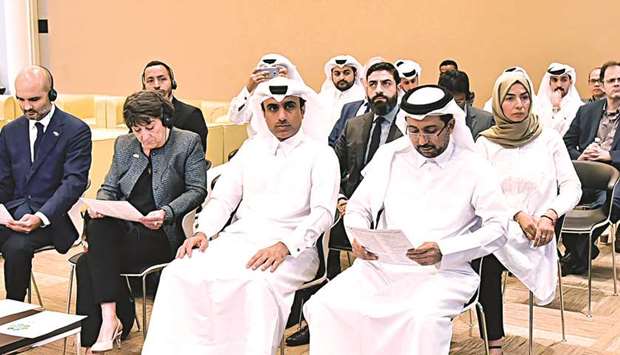The Guest Workers’ Welfare Index (GWWI) overall rating has increased from 75 in 2017 to 81 in 2018, indicating an improvement in the overall welfare of guest workers in the country.
The sub-indices that improved the most since 2017 included contracts, working conditions and satisfaction with different aspects of working and living conditions, it was revealed at an event held by the Social and Economic Survey Research Institute (Sesri) at Qatar University (QU) to present the results from the second wave of the GWWI.
The index is used to measure and track the welfare of blue-collar guest workers in Qatar.
“These ratings suggest that further improvement in the overall welfare of guest workers requires continuous efforts in informing workers about their rights, easing their full understanding of their contracts and fully honouring their contracts,” QU said in a press statement yesterday.
Attendees at the event included Dr Hassan al-Derham, president of QU; Dr Hassan al-Sayed, director of Sesri; and representatives from the Ministry of Administrative Development, Labour and Social Affairs as well as other guests from government, non-government and private sector organisations.
The results of the GWWI wave 2 were based on a nationally representative survey of blue-collar guest workers conducted during April 2018. The survey assessed several aspects of working and living conditions of these workers, including safety and security at working sites and living compounds, human rights and labour rights, finance and remittances, as well as treatment by their employers, the statement noted.
The largest group of respondents came from India (29%), followed by Nepal (28%), Bangladesh (17%), Pakistan (9%), Egypt (6%), Sri Lanka (4%), the Philippines (3%) and other
countries (4%).
A total of 1,028 guest workers residing in collective housing in Qatar completed the survey, yielding a response rate of 87% and a maximum sampling error of +/- 3.4 percentage points. The calculation of this sampling error takes into account the design effects. The final dataset was weighted to adjust for probability of selection and non-response.
The 2017 index represented a baseline and marked the beginning of an effort to assess and track the welfare of guest workers in Qatar.
Going forward, Sesri is conducting the third annual survey of the Guest Workers’ Welfare Index in May.
“The welfare of migrant labourers around the world has received significant attention from the global media and scholarly community. In the Gulf, attention has been directed towards Qatar mostly due to the FIFA 2022 World Cup. However, much of the public discussion of the problems has not been based on unbiased, quantitative and qualitative measurements that can be generalised to the overall migrant labour population,” the statement pointed out.

QU president Dr Hassan al-Derham and other officials at the event where the GWWI results were announced.
